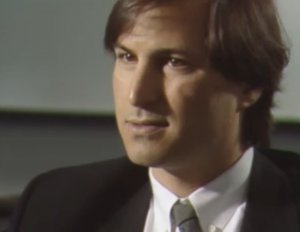 According to some, market research is pretty useless in contexts of uncertainty. These contexts include disrupted markets, the introduction of radical new innovations, or the launch of new products and services. Steve Jobs explained this view in an interview:
According to some, market research is pretty useless in contexts of uncertainty. These contexts include disrupted markets, the introduction of radical new innovations, or the launch of new products and services. Steve Jobs explained this view in an interview:
"The problem is that market research can tell you what your customers think of something you show them, or it can tell you what your customers want as an incremental improvement on what you have, but very rarely can your customers predict something that they don't even quite know they want yet. As an example, no market research could have led to the development of the Macintosh or the personal computer in the first place. So there are these sorts of non-incremental jumps that need to take place where it is very difficult for market research to really contribute much in the early phases of the thinking about, you know, what those should be. However, once you have made that jump, possibly before the product is on the market or even after, it's a great time to go check your instincts with the marketplace and verify that you're on the right track." (PBS/Nova Interview,1990)
Steve Jobs could recognize the usefulness of market research, but he suggests it is not useful when the market is going through these non-incremental jumps. A similar mindset is found in an even stronger form in certain parts of the present-day startup community: it is often thought that it's better to just bring a product to market and see what happens, rather than rely on misleading market research that is incapable of envisioning the future.
 There is no doubt that many companies succeed by adopting approaches that do not involve much market research. However, this in itself is not a sound proof for ruling out the usefulness of market research, because we have no idea how many failed startups would have succeeded if they had paid more attention to the findings of market research. Instead of being based on a sound empirical argument, the plausibility of this argument seems to rest, in part, on a number of assumptions about what market research is, and how it works.
There is no doubt that many companies succeed by adopting approaches that do not involve much market research. However, this in itself is not a sound proof for ruling out the usefulness of market research, because we have no idea how many failed startups would have succeeded if they had paid more attention to the findings of market research. Instead of being based on a sound empirical argument, the plausibility of this argument seems to rest, in part, on a number of assumptions about what market research is, and how it works.
Standard Market Research and the Principle of Continuity
When Steve Jobs spoke about market research, he was likely speaking about a particular kind of research. These are the surveys asking you to rate services on a scale of 1 to 10, asking you whether you prefer red cars or blue cars, or giving you complicated conjoint trees to determine if it is more important for you to get more product or lower prices. All of these studies depend implicitly on a principle of continuity: that your present opinions can be used to reliably predict your future actions.
As Jobs appears to recognize, this principle can break down in disrupted markets. If we look at this principle in more detail, it typically implies at least four sub-principles, all of which can fail when one is conducting research:
1. The overall market will be the same in the future as it is now. This principle is reasonable in many situations, but Jobs proved it false when his teams introduced the Macintosh, the iPod, the iPhone and the iPad, each of which changed the markets in fundamental ways. Furthermore, it fails all the time in ordinary business practice: financial bubbles burst, companies that are on the top of the world go bankrupt a few years later, entire industries disappear.
2. A respondent's beliefs will be the same in the future. Closely aligned with the preceding principle, a respondent's views can change even if the other components of the market do not. Someone might be against sharing credit card numbers or personal information online when they take a survey, but come to accept the practice a few months later.
3. Respondents are accurately conveying their present beliefs when they take a survey. It's common knowledge that people sometimes lie on surveys, or under-report activities they are ashamed of. However, even when people are trying to accurately convey their present beliefs, they may fail to do so. In particular, we tend to think of our personalities as uniform over time and place, but many of us adopt very different personas when we spend time with our family, or with our friends, or with our colleagues, or when we are on our own. A view we reveal on a survey may not reflect the view we act on later while partying with friends.
4. What someone says accurately reflects what they will do. This belief is questioned frequently today as big data enables us to actually track the difference between saying and doing. In certain cases, it may turn out that basing predictions on past actions rather than opinions produces more accurate results.
In markets that remain constant over a long period of time, it may be unnecessary to question any of these principles. For instance, a mere correlation between what people say and an increase in sales might be all that is needed for an incremental gain, and no one may care to think any more deeply about why it's the case.
Market Research in Uncertain Times
However, as soon as contexts arise when the principle of continuity does not hold, companies and whole markets can be led badly astray if they merely follow past correlations. In these situations, as Jobs notes, respondents may very well not know what they will want.
Yet, even in the most disrupted markets, where there are many discontinuities at the surface, there may be underlying factors that do not change, and therefore at deeper levels the principle of continuity can still hold, and research still has something to say.
In these cases, instead of mechanically asking respondents, "How likely is it that you would buy this new product?," one should begin by thinking hard about the context of purchasing and using the product and ask, "What things have to be true if people are going to buy this product?" Moving from the general question to a hypothesis about its components in this way does at least four things:
- First, it forces us to articulate and address the most important assumptions we are making. Often, we are implicitly assuming things that will prove to be false. Identifying the assumptions before conducting research allows us to explicitly test them.
- Second, once we have identified a broader range of assumptions, we may be led to reconceive the range of possibilities we need to take into account in our questions and in the subsequent analysis. For instance, we may determine that a particular assumption does not hold in general and thereby identify new segments. These different segments may have different needs and decision-criteria.
- Third, it can lead us to identify important outliers that do not necessarily conform to our expectations. If we think that a factor is essential, and it turns out to be false for a small number of respondents, this may be a cue to talk further with those individuals. Perhaps they are anticipating the next big trend in the market.
- Fourth, it makes us think more deeply about the enterprise we are undertaking. Part of this comes from the fact that good research leads us to ask "Why?" questions that we may not have even thought about before.
Analyzing decisions into components makes it possible to find continuities in conditions of uncertainty. Moreover, when we have the whole framework of assumptions and possibilities available, it then becomes possible to track underlying factors that do change through proxies and analogical trend analyses.
 Implementing this approach well requires a different mindset and a broader range of skills than most standard market research companies offer. Identifying assumptions requires being able to break things down into their components like an engineer or analytical philosopher. Exploring possibilities and outliers requires a certain openness to possibility characteristic of design-thinking approaches. Thinking more deeply may require additional skills such as big-data analysis, statistics, expert interviews, or ethnographic studies. Yet, all of these approaches can be incorporated into a research strategy.
Implementing this approach well requires a different mindset and a broader range of skills than most standard market research companies offer. Identifying assumptions requires being able to break things down into their components like an engineer or analytical philosopher. Exploring possibilities and outliers requires a certain openness to possibility characteristic of design-thinking approaches. Thinking more deeply may require additional skills such as big-data analysis, statistics, expert interviews, or ethnographic studies. Yet, all of these approaches can be incorporated into a research strategy.
Many skills may be required, but great consultants and entrepreneurs often bring together many of these research skills. I'm thinking of when Orit Gadiesh talked to customers and metallurgists when she introduced a Bain client to continuous casting techniques in steel manufacturing. Or, when survey data led Howard Moskowitz to discover that there was no perfect recipe for Prego tomato sauce. Steve Jobs, especially, shows the passion of a good researcher. This is quite apparent in his interviews in which he enthusiastically discusses quantifying data, visiting 80 automated manufacturers in Japan to understand automation, or revising products after observing people using them. People can bring about the future through research, albeit of a non-standard type.
This much may be obvious. However, what might not be obvious is that even the most humble research tools can benefit from this approach. An online survey constructed to test hypotheses about decision factors can tell you not only why your customers make the decisions they do, but also can help you make better predictions in uncertain contexts.
Follow Jobs' Advice: Ask the Right Questions
In another interview five years later, Steve Jobs was asked about his transition from being a hobbyist to being the executive of a multimillion dollar company. "How do you learn to run a company?," he was asked. He observed, "You know, throughout the years in business I found something, which is, I always asked why you do things. And the answer you invariably get is that it's just the way it's done. Nobody knows why they do what they do. Nobody thinks about things very deeply in business, that's what I found." (Steve Jobs, The Lost Interview, 1995)
It turns out Steve Jobs didn't like market research when introducing non-incremental changes, because he was a great researcher himself. According to his own account, the secret to his success in business was asking the right questions and not settling for status quo responses. Unless you have the luxury of being in an industry without innovation or disruption, you and your research company shouldn't settle for the status quo either.
By @jfhannon, CEO at Justkul Inc., a research firm focused on the needs of strategy and private equity.
